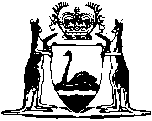
Public Education Endowment Act 1909
|
|
|
Reprinted under the Reprints Act 1984 as |
|
at 8 May 2015 |
||
Western Australia
Public Education Endowment Act 1909
Contents
1.Short title1
1A.Terms used1
2.Power to appoint trustees1
3.Trustees to be body corporate2
4.Endowment2
5.Property to be held in trust for public education2
6.Powers of trustees2
7.Power to lease and, with approval of Governor, to mortgage or exchange lands3
8.Power to dispose of land acquired by gift3
9.Investment and application of rents and profits3
9A.Power to sell and apply money held4
10.Exemption of trust property from taxation4
11.Meetings5
12.Officers5
13.Remuneration of trustees5
14.Application of Financial Management Act 2006 and Auditor General Act 20065
15.Act not to affect University of Western Australia Act 19115
Notes
Compilation table6
Defined terms
|
|
|
Reprinted under the Reprints Act 1984 as |
|
at 8 May 2015 |
||
Western Australia
Public Education Endowment Act 1909
An Act for the endowment of public education.
This Act may be cited as the Public Education Endowment Act 1909 1.
In this Act unless the contrary intention appears —
chief executive officer of the department means the chief executive officer of the department referred to in section 228 of the School Education Act 1999;
[Section 1A inserted: No. 3 of 1970 s. 2; amended: No. 7 of 1988 s. 25; No. 22 of 1996 s. 16(10); No. 36 of 1999 s. 247.]
(1)The Governor may appoint the Minister charged with the administration of the School Education Act 1999, the chief executive officer of the department for the time being, and 3 other fit and proper persons to be the trustees of an endowment for public education and may, upon the death, resignation, or absence from the State of any trustee, appoint any other fit and proper person a trustee in his place.
(2)The trustees other than the Minister referred to in subsection (1) and the chief executive officer of the department shall be appointed from time to time for not exceeding 3 years, and shall be eligible for re‑appointment.
[Section 2 amended: No. 63 of 1981 s. 4; No. 7 of 1988 s. 26; No. 36 of 1999 s. 247.]
3.Trustees to be body corporate
The trustees so appointed shall be a body corporate by the name of the “Trustees of Public Education Endowment,” and by that name shall have perpetual succession and a common seal, and shall be capable of suing and being sued, and subject to the provisions of section 7, shall have power to hold, take, purchase, sell, lease, and in any manner deal with real and personal property for the purposes of this Act.
By way of permanent endowment, the Governor may grant or demise to the trustees such lands of the Crown as he may think fit.
5.Property to be held in trust for public education
All real and personal property vested in the trustees, or acquired by them by purchase, gift, devise, bequest, or otherwise, shall be held in trust for the purposes of public education.
The trustees shall have the entire control and management of all real and personal property at any time vested in or acquired by them; and may set out roads, streets, and open spaces, and erect and maintain buildings upon and otherwise improve any land or other property as in their absolute discretion they may think fit, and may apply any trust funds in their hands to any such purposes.
7.Power to lease and, with approval of Governor, to mortgage or exchange lands
The trustees may grant leases of any lands granted or demised to them as aforesaid for any term not exceeding 21 years, and with the approval of the Governor, but not otherwise, may grant leases for any term not exceeding 99 years, and may, with the like approval, mortgage or exchange such lands.
[Section 7 amended: No. 7 of 1925 s. 2.]
8.Power to dispose of land acquired by gift
The trustees may dispose of any real or personal property acquired by gift, devise, or bequest as they may think fit, subject only to the express trusts of any deed, will, or instrument under which such property is acquired by them.
9.Investment and application of rents and profits
The rents, issues, profits, and proceeds of sale of all real and personal property vested in or acquired by the trustees, after payment of the expenses of and incidental to the administration of the trust, shall be paid into the Treasury, and may be invested in the names of the trustees as trust funds may be invested under Part III of the Trustees Act 1962, or, with the approval of the Governor, in the purchase of other land to be held on the trust hereby created:
Provided that the annual income of all such real and personal property and investments may be applied by the trustees towards the improvement of such property, and the payment of salaries and other expenditure in carrying out the provisions of the Acts in force for the time being relating to public education:
Provided also that the proceeds of sale of any property or any moneys received by the trustees as premiums for the granting of leases, or raised by way of mortgage, may, with the approval of the Governor but not otherwise, be applied by the trustees in the improvement of any property vested in them.
[Section 9 amended: No. 1 of 1997 s. 18.]
9A.Power to sell and apply money held
Notwithstanding the other provisions of this Act or the provisions of any other Act, on and after the coming into operation of the Public Education Endowment Act Amendment Act 1970 1 the trustees, with the approval of the Governor —
(a)may sell any land vested in them for the purposes of public education pursuant to section 4 and may transfer the land to the purchaser free of all trusts; and
(b)where they hold money derived, as proceeds of sale or otherwise, from land that was or is vested in them for the purposes of public education pursuant to section 4, irrespective of whether they received the money before or after the coming into operation of the Public Education Endowment Act Amendment Act 1970 1, may, for the purposes of public education, apply the money or any portion of it, and the whole or any portion of income from the money, to the improvement of land vested in the Minister for Education.
[Section 9A inserted: No. 3 of 1970 s. 3.]
10.Exemption of trust property from taxation
No tax or rate shall be charged or levied upon any property acquired by the trustees under this Act, or upon the trustees in respect thereof; but the benefit of such exemption shall not extend to any other person who may become the owner of any estate or interest in such property, whether as purchaser, lessee, or otherwise; and notwithstanding such exemption, such property shall be rateable while the same is leased or occupied for any private purpose.
The trustees shall meet for the transaction of the business of the trust at such times as they may appoint, and any 3 of them shall be a quorum.
The trustees may from time to time appoint and dismiss such officers or servants as they may deem necessary, and may pay them such salaries or remuneration as they may think fit.
The trustees may receive, out of the income of the trust property, such remuneration as the Governor may approve.
14.Application of Financial Management Act 2006 and Auditor General Act 2006
The provisions of the Financial Management Act 2006 and the Auditor General Act 2006 regulating the financial administration, audit and reporting of statutory authorities apply to and in respect of the trustees and their operations.
[Section 14 inserted: No. 98 of 1985 s. 3; amended: No. 77 of 2006 Sch. 1 cl. 135.]
15.Act not to affect
This Act shall not affect the provisions of the
[Section 15 amended: No. 75 of 2000 s. 18.]

1This reprint is a compilation as at 8 May 2015 of the Public Education Endowment Act 1909 and includes the amendments made by the other written laws referred to in the following table. The table also contains information about any reprint.
|
Short title |
Number and year |
Assent |
Commencement |
|
Public Education Endowment Act 1909 |
32 of 1909 (9 Edw. VII No. 28) |
4 Dec 1909 |
4 Dec 1909 |
|
Public Education Endowment Amendment Act 1925 |
7 of 1925 (16 Geo. V No. 7) |
24 Sep 1925 |
24 Sep 1925 |
|
Ministers’ Titles Act 1925 s. 2 |
8 of 1925 (16 Geo. V No. 8) |
24 Sep 1925 |
24 Sep 1925 |
|
Public Education Endowment Act Amendment Act 1970 |
3 of 1970 |
29 Apr 1970 |
29 Apr 1970 |
|
Acts Amendment (Statutory Designations) and Validation Act 1981 s. 4 |
63 of 1981 |
13 Oct 1981 |
13 Oct 1981 |
|
Acts Amendment (Financial Administration and Audit) Act 1985 s. 3 |
98 of 1985 |
4 Dec 1985 |
1 Jul 1986 (see s. 2 and Gazette 30 Jun 1986 p. 2255) |
|
Reprint of the Public Education Endowment Act 1909 as at 29 Dec 1987 |
|||
|
Acts Amendment (Education) Act 1988 Pt. 11 |
7 of 1988 |
30 Jun 1988 |
8 Jul 1988 (see s. 2 and Gazette 8 Jul 1988 p. 2371) |
|
Education Amendment Act 1996 s. 16(10) |
22 of 1996 |
11 Jul 1996 |
11 Jul 1996 (see s. 2(1)) |
|
Trustees Amendment Act 1997 s. 18 |
1 of 1997 |
6 May 1997 |
16 Jun 1997 (see s. 2 and Gazette 10 Jun 1997 p. 2661) |
|
School Education Act 1999 s. 247 |
36 of 1999 |
2 Nov 1999 |
1 Jan 2001 (see s. 2 and Gazette 29 Dec 2000 p. 7904) |
|
Universities Legislation Amendment Act 2000 s. 18 |
75 of 2000 |
7 Dec 2000 |
13 Jan 2001 (see s. 2(1) and Gazette 12 Jan 2001 p. 245) |
|
Reprint of the Public Education Endowment Act 1909 as at 4 Jan 2002 |
|||
|
Financial Legislation Amendment and Repeal Act 2006 Sch. 1 cl. 135 |
77 of 2006 |
21 Dec 2006 |
1 Feb 2007 (see s. 2(1) and Gazette 19 Jan 2007 p. 137) |
|
Reprint 3: The Public Education Endowment Act 1909 as at 8 May 2015 (includes amendments listed above) |
|||
[This is a list of terms defined and the provisions where they are defined. The list is not part of the law.]
Defined termProvision(s)
chief executive officer of the department1A
purposes of public education1A
